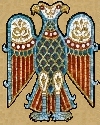The following are some of the aspects which made Byzantine Paganism separate
and unique from the Classical religions, even as it continued the worship of
the Classical Goddesses and Gods:
1. Byzantine Paganism lasted for over 1,100 years, from the
conversion of Constantine in 312 AD until after the fall of Constantinople in
1453 AD.
2. Byzantine Paganism preserved preserved Greek, Roman and local Provincial
pagan traditions, a continuation of the syncretistic practices of previous
eras.
3. Byzantine Paganism became a smaller, more personal religion (much like the
paganism of today) as the ancient Temples were officially closed and ancient
religion was removed from public life.
4. The state priesthoods would have been driven underground in an effort to
continue the worship of the ancient Goddesses and Gods after the closing of
temples.
5. Its functionaries took on many roles (much like the paganism of today) as
there were less dedicated priesthood to perform regular rites.
6. Without temples, its places of worship became temporary (like today)
instead of permanent structures.
7. It began to incorporate more Philosophy as philosophy was accepted in the
Byzantine world.
8. It began to incorporate more astrology as this was also accepted in the
Byzantine world.
9. Instead of statuary, its religious images began to be smaller and more
private representations; icons and dyptechs.
10. It began to incorporate more magical aspects as its participants sought to
gain protection. This included the use of amulets and talismans.
11. It became more private and family oriented as wider community became more
dangerous.
12. Byzantine Paganism became more adaptive as it had to compete with and
exist alongside a mixture of monotheistic faiths; the same situation face by
pagans today.
 Byzantine Paganism
Byzantine Paganism

 Byzantine Paganism
Byzantine Paganism

![]()
![]()